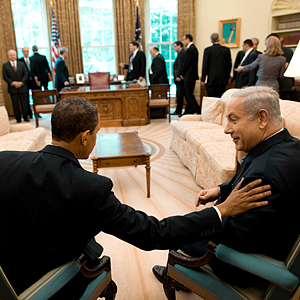September 26, 2016
Chen Kane, W. Seth Carus, Nima Gerami
The following is an excerpt of an article in The National Interest:

President Barack Obama talks with Israeli Prime Minister Benjamin Netanyahu in the Oval Office Monday, May 18, 2009. Offical White House Photo by Pete Souza. (Source: White House Flickr.com account)
After months of tense and drawn-out negotiations, on September 14 the United States and Israel signed the largest US military aid package given to any country, amounting to $3.8 billion annually. The new aid package reaffirms the United States’ unwavering commitment to the security of Israel. But the culmination of the aid deal, set to come into effect in 2018, also underscores the delicate and increasingly fractured relations between the United States and Israel during the Obama-Netanyahu era. While bilateral security cooperation between the two allies remains strong—and will likely remain so regardless of who is elected US president in November—the last five years highlight a widening rift in US and Israeli strategic objectives at a time of increasing turmoil and uncertainty in the Middle East.
With the effective conclusion of US-Israeli negotiations for the military aid package, the next US administration should take note of the need to restore trust with Israel and find ways to foster a more collective security mindset in the Middle East.
Despite record levels of US military assistance to Israel under the Obama administration, the state of US-Israel relations has worsened, not strengthened, in recent years. This strategic drift goes beyond the personal friction between President Barack Obama and Prime Minister Benjamin Netanyahu. At the core of this tension are fundamental differences in threat perceptions, strategic prioritization, and policy options for confronting unprecedented change in the Middle East. Whereas Washington has been frustrated by Israel’s settlement policy and the lack of progress in the Israeli-Palestinian peace process, Tel Aviv sees Iran and its destabilizing activities as its most immediate security threat—even more than the Islamic State of Iraq and the Levant (ISIL). The signing of the Iran nuclear agreement last year widened US-Israeli strategic differences and contributed to a growing perception, shared by Tel Aviv and Gulf Arab capitals, that the United States is tolerating Iran’s antagonistic role in the region at the expense of its traditional allies. The perception of eroding US credibility in the region—a view held by conservative and moderate members of the Israeli national security community, as well as by America’s staunchest allies in the Gulf region—has exacerbated these fears.
Continue reading at nationalinterest.org.
